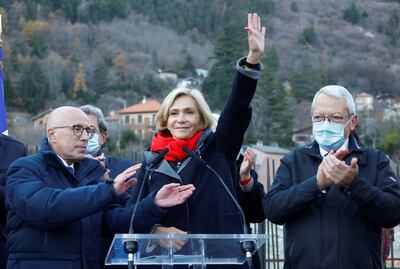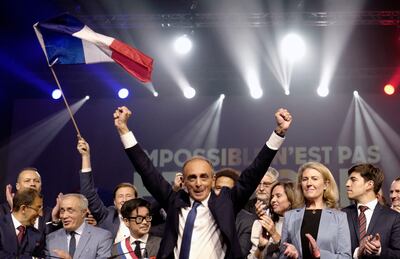Emmanuel Macron gave an impassioned defence of his record as France’s President in a prime-time interview that set the stage for his expected re-election bid next spring.
While again refusing to confirm that he would seek a second term, Mr Macron spoke about his ambitions for France “beyond next April” and said he “never thought that we could do everything in five years”.
He rejected his depiction as an arrogant “president of the rich” – telling TV channel TF1 that he had sometimes been harsh but had learnt to “have a lot more respect for everyone”.
Mr Macron’s undeclared campaign has irritated his rivals, who believe he is unfairly using the presidential megaphone to pave the way for re-election.
Valerie Pecresse, a centre-right candidate enjoying a bounce in the polls, said she would complain to media regulators about imbalanced coverage.
“We can’t have a president-candidate who has television channels open up for him whenever he wants it and is campaigning for hours on end, while his opponents get five minutes on a panel to respond to him,” she said.
In an unusually candid interview filmed in the Elysee Palace, Mr Macron admitted mistakes in his five-year term and said he was “more sensitive to some things than I was before”.
But he defended the pro-business economic reforms that contributed to the sometimes violent Yellow Vest protests in 2018 and 2019.

The former investment banker said France’s economy could withstand the pandemic “because we had done the work, because we had credibility, a solidity linked to the reforms of the labour market”.
“We made reforms … to get a much stronger economy, which is the case of the French economy today compared to five years ago,” he said. “The result is here: We have the lowest unemployment rate in 15 years."
Describing his "president of the rich" label as a caricature, he said: "I am ambitious for our country, I am for innovation, I want a country whose economy is strong, a country that is fair."
Since winning the presidency as a centrist insurgent in 2017, Mr Macron's policymaking is widely perceived as having drifted to the right.
Nonetheless, his main challengers next year are expected to come from further right – with Ms Pecresse vaulting ahead of far-right candidates Marine Le Pen and Eric Zemmour in some polls.
Mr Zemmour responded to the interview by accusing Mr Macron of talking too much about himself rather than France.
He said the president had presided over a national decline and a “great replacement”, invoking a far-right conspiracy theory about immigration.

On the left, polls suggest candidates Anne Hidalgo, Jean-Luc Melenchon and environmentalist Yannick Jadot have little chance of reaching the second round run-off.
But after months of polls showing Mr Macron on course to win the second round, one recent survey suggested Ms Pecresse could narrowly beat him.
She was nominated this month as the candidate of the centre-right Republicans in a surprise victory over rivals such as former EU Brexit negotiator Michel Barnier.
The president is following predecessors such as Nicolas Sarkozy and Francois Mitterrand in keeping voters in suspense until the last moment. Previous president Francois Hollande announced unexpectedly in 2016 that he would not run again.
Mr Macron's TV appearance followed a major intervention on European policy last week, when he called for stronger EU border defences and an overhaul of economic rules.
France will take on the rotating presidency of the EU from January, while Angela Merkel’s departure as German chancellor opens the door for Mr Macron to assume a more dominant role.
At home, Mr Macron has toured small-town and rural France while his party canvasses voters and gathers donations.
Asked in the TF1 interview if he would seek a second term, he replied: “If your question is 'are you looking ahead, do you have ambitions for our country, for French people beyond next April?'. Clearly.”








